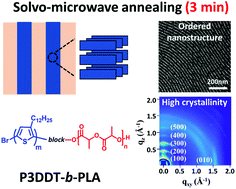Rapid solvo-microwave annealing for optimizing ordered nanostructures and crystallization of regioregular polythiophene-based block copolymers†
Abstract
Manipulation of crystalline structures of conjugated polymers (CPs) within nanostructured block copolymer (BCP) domains is crucial to enhance their electrical properties. However, this has been a challenge due to the intrinsic incompatibility between crystallization and phase-separation process of CP-based BCPs, which often causes break-out crystallization and results in disordered nanostructures and poor electrical properties. Herein, we demonstrate solvo-microwave annealing as an effective method for producing thin film structures of CP-based BCPs with well-ordered nanostructures and high crystallinity in a very short processing time (∼3 min). This approach is applied for poly(3-dodecylthiophene)-block-poly(lactic acid) (P3DDT-b-PLA) copolymers as a model system, where the PLA block offers the additional benefit of selective etchability to provide an on-chip etch mask for pattern transfer. The conventional thermal annealing process, even with a long annealing time (∼24 h), resulted in incompatibility between ordered nanostructures and the crystallization of the conjugated polymer. In contrast, the solvo-microwave annealing with a combination of heat and solvent vapor treatment was employed to grant enhanced chain mobility and solvent interaction with the π–π structure of the conjugated polymer. As a result, this process rapidly generated nanostructures with very few defects within 3 min and, at the same time, the highly crystalline intermolecular ordering of the P3DDT blocks occurred. Furthermore, we demonstrate the successful transfer of highly-ordered P3DDT structures after the removal of the PLA domain, which is important for potential applications in nanolithography and electronics.



 Please wait while we load your content...
Please wait while we load your content...